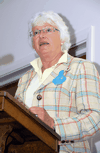Fischer Boel calls for “compromise” in final CAP negotiations

EU agriculture commissioner Mariann Fischer Boel has identified five key areas that will be open for negotiation as Brussels prepares to finalise the CAP “health check” later this week.
The European parliament will debate the package on Tuesday (18 November) and vote on it on Wednesday. Its views will then be fed into the EU farm council, with agriculture ministers expected to negotiate through the night to secure an agreement.
Speaking ahead of the discussion, Mrs Fischer Boel said all parties should be willing to compromise.
“But we also need to be bold. We need to free our farmers to follow their business instincts, while continuing to provide them with support from the public purse,” she said.
A number of subjects still remained “open”, including modulation, milk quotas, Article 68 measures, decoupling and intervention.
Modulation
The EU Commission has proposed further cuts in farmers’ single farm payments to shift more money into rural development – particularly the “new challenges” of climate change, water management, biodiversity and biofuels.
Its proposal would see compulsory EU modulation raised from 5% to 13% in equal (2%) steps by 2012. In addition the commission is calling for “progressive” modulation, so farmers getting over €100,000 in SFP would face an extra 3% cut, over €200,000 an extra 6% and over €300,000 an extra 9%.
These figures are likely to be reduced considerably during the course of the negotiations.
Milk quota
The EU Commission has called for the abolition of milk quotas in 2015 and, to ensure a “soft landing”, is proposing a 1% per year increase for the next five years.
Member states are split on this issue, with some wanting greater increases (Italy, The Netherlands and Poland), and some wanting smaller increases (Austria, Belgium, Luxembourg).
One idea mooted at the council meeting in October was for member states to be allowed to “front load” the increases, so countries like Italy could raise their quota by the full 5% in the first year. The UK opposes this.
Some ministers also want a dairy market review in 2011, before deciding on the final abolition of quotas.
Article 68
This is the measure that allows member states to slice up to 10% from direct payments and put the money into national envelopes. These can then be used to:
- support farming systems with environmental benefits
- pay for food quality and marketing initiatives
- support dairy, beef or sheep farmers in disadvantaged regions
- help finance crop insurance programmes and animal disease funds
According to the EU Commission, any trade distorting payments within these envelopes should be limited to 2.5% of the funds available.
While most member states like the flexibility, some are concerned by the extent to which Article 68 could lead to trade distortion. For example, it could result in additional income support for Austrian dairy farmers or French beef producers, while UK producers get nothing.
Decoupling and Intervention
The EU Commission is planning to scrap partial decoupling in the crops sector and phase out beef special premium and beef/calf slaughter premiums by 2012. Only suckler cow premium and ewe premium would remain in some member states.
It also wants to limit intervention buying to bread wheat, sugar, beef and dairy products, based on a tendering system. Intervention for rice, durum wheat, barley and pigmeat would end.
Some ministers are very concerned by the tendering idea, which give the EU Commission effective control over the market.
Other issues
As well as these more controversial issues, the CAP health check seeks to end set-aside, simplify cross-compliance, abolish the energy crop premium, encourage member states to move to a “flat rate” SPS system and eliminate “pony paddock” claimants.
